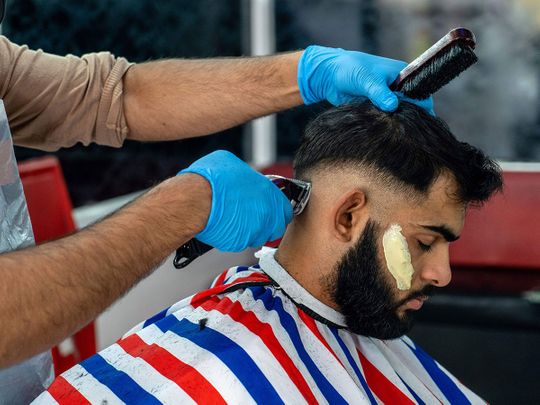

A hairdresser wearing a face mask, due to the COVID-19 pandemic, cuts a client’s hair.
Image credit: AFP
Washington: Two American stylists wearing masks while infected with the coronavirus did not transmit COVID-19 to nearly 140 clients they saw over the course of several days, a study said Tuesday.
The Centers for Disease Control and Prevention, which published the report, said the findings added weight to universal coverage policies as a means of curbing the spread of the SARS-CoV-2 virus.
On May 12, a stylist (Stylist A) developed respiratory symptoms in a salon in Springfield, Missouri, and continued to work with clients until May 20, when she received a positive test for the new coronavirus.
Stylist A ignored medical advice to isolate herself after her test on May 18.
A second stylist (Stylist B), who had been exposed to the first, developed symptoms on May 15 and also continued to work until May 20, when Stylist A obtained his result.
Stylist B tested positive two days later.
At this point, the salon closed for three days for disinfection, while Greene County health officials followed up on contacts, identifying a total of 139 clients served by the two infected stylists.
The rest of the staff was also quarantined for two weeks.
During their interactions with clients, both stylists wore masks: Stylist A wore a double-layer cotton face covering, while Stylist B used a double-layer cotton face covering or surgical mask.
But even when Stylist A had symptoms, the two stylists interacted with each other while neither was masked at intervals between clients.
The 139 clients were monitored for symptoms over the next two weeks, and all were offered the test to be performed five days after their exposure.
None of the 67 who were tested were found to be positive, and none of those who declined the test reported symptoms over the next 14 days when they were sent daily text messages asking about their health.
Clients had a rough gender balance, and their ages ranged from 21 to 93, with an average average of 52. The overwhelming majority wore masks for the entire duration of their appointments, ranging from 15 minutes to 45 minutes.
Clients mostly wore cloth masks or surgical masks, while about five percent wore N95 respirators.
Scientists believe that although the large droplets emitted by people when coughing or sneezing are primarily responsible for the spread of COVID-19, the smallest droplets released during ordinary speech are also potentially dangerous.
This is particularly important because people can unknowingly spread the virus in the two to three days before they develop symptoms, or a carrier in rare cases can never develop symptoms.
The authors of the CDC report concluded: “The widespread adoption of policies requiring facial coatings in public settings should be considered to reduce the impact and magnitude of additional COVID-19 waves.”